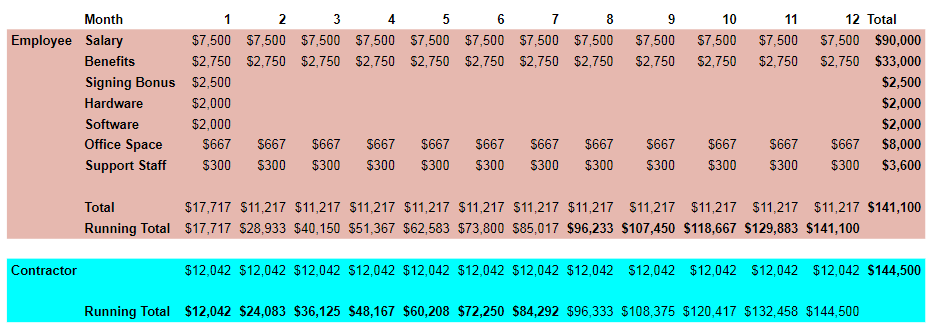Having run a successful game development outsourcing firm for some time now, I’ve noticed that there’s a significant stigma associated with outsourcing work. To be fair, many people get burned by outsourcing to the lowest bidder, which is often offshore developers. However, that’s a post for another day. Let’s just consider competent local developers for a moment, and in this post, I’ll cover some of the arguments against outsourcing that I’ve heard:
Myth: It costs too much.
In my experience, this isn’t necessarily true if you compare apples to apples. Take the following example of a mid level engineer with a salary of $90,000 per year vs a mid level engineer contractor at $85 per hour. For the employee, you need to add benefits, signing bonus, hardware, software licenses, office space, and support staff such as IT, HR, and admin. Also, don’t forget that the employee gets paid for vacation time (3 weeks per year in this example). I’ve reduced the contractor’s hours by that amount since they may take vacation as well, but they don’t get paid for it. This way, the work output is the same for both.
As you can see, the contractor is actually less expensive for the first 7 months. I’m also not including severance in the case of terminating the employee or the cost of tracking down talent, which could easily make the contractor more cost effective through the first year.
Myth: We won’t have in house knowledge of the work.
This seems like a very valid point on the surface, and in some circumstances, it makes a lot of sense. With outsource firms like Tricky Fast, we typically work as part of your team. We make an effort to provide documentation and cross training both with our clients and within our team. This has the effect that knowledge is isn’t lost if a single contractor leaves in the same way that it wouldn’t for an employee if the same tactics are used. However, there’s an even bigger refutation here. If an employee leaves, they’re typically gone. With an outsourcing firm, especially one that retains the same staff like we do, we can be brought back in for any questions that come up or follow up work, so it’s not as if the knowledge is lost.
Myth: Communication isn’t as good with off site workers.
There can be a case made for this if your company doesn’t use Slack, Skype, Google Chat, or other online communication methods, but that’s increasingly unlikely. It is certainly important for the staff at the outsourcing firm to work effectively remotely and to have excellent communication skills, but that comes down to hiring decisions. With the right people and communication methods, the lack of face to face interaction isn’t a detriment.This does require cooperation on our client’s part to include contractors in important meetings and to also be responsive to communication.
Myth: We don’t want to pay for ramp up time or have it be a drain on our staff.
Ramp up time for a single contractor isn’t going to be different from an employee. In fact, it is more likely to be less for a contractor as they are more used to jumping into new environments and quickly getting up to speed. Good outsourcing firms like Tricky Fast will also ensure that additional resources that come in will be trained internally so as not to bother our client’s staff. This goes beyond ramp up time, too. Once we have in house knowledge of anything, we shouldn’t need to ask again.
Myth: Contractors need their hands held and require detailed specs or design documents.
While this is certainly true and a major point of pain when working with offshore and other low cost outsourcing firms, when dealing with experienced contractors like we have at Tricky Fast, you aren’t just paying for code monkeys. We cost more partly because we apply our extensive industry experience to whatever problems are in front of us. While it’s sometimes a fine line, experienced outsource firms will also be able to warn you if there’s problems with your approach and suggest a better one. Of course, in the end, the client is the boss, but part of our usefulness is in identifying problems and providing solutions.
Stay tuned for the next installment talking about the benefits of using outsourcing to your company and to the game industry as a whole.








Pingback: The Case For Outsourcing In The Game Industry: Part II | Tricky Fast Studios August 17, 2017
[…] you haven’t already, please check out part one in this series. This time I’d like to talk about the problems that outsourcing can […]